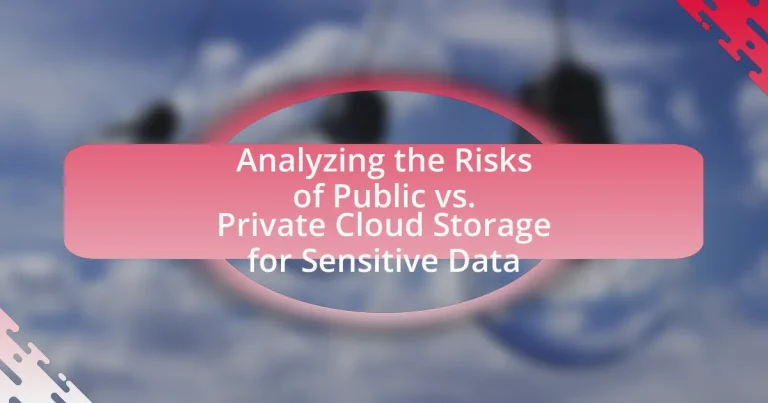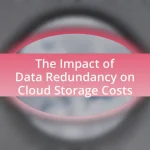The article analyzes the risks associated with public and private cloud storage for sensitive data, highlighting key differences between the two storage solutions. Public cloud storage, offered by third-party providers, allows multiple users to share infrastructure, providing scalability and cost-effectiveness but exposing data to higher security risks. In contrast, private cloud storage is dedicated to a single organization, offering enhanced control, security, and compliance with regulations, making it more suitable for sensitive data management. The article further explores operational mechanisms, security measures, vulnerabilities, compliance issues, and best practices for organizations to consider when choosing between public and private cloud storage options.
What are the key differences between public and private cloud storage?
Public cloud storage is a service offered by third-party providers that allows multiple users to store data on shared infrastructure, while private cloud storage is dedicated to a single organization, providing greater control and security. Public cloud storage typically offers scalability and cost-effectiveness, as users pay for what they use, but may expose sensitive data to higher risks due to shared resources. In contrast, private cloud storage allows for customized security measures and compliance with regulations, making it more suitable for sensitive data management. According to a report by Gartner, organizations using private clouds can achieve up to 30% more security for sensitive data compared to public cloud solutions.
How do public cloud storage solutions operate?
Public cloud storage solutions operate by allowing users to store and access data over the internet on servers maintained by third-party providers. These providers utilize a multi-tenant architecture, where multiple customers share the same physical infrastructure while maintaining data isolation through virtualization technologies. This model enables scalability, as users can easily increase or decrease their storage capacity based on demand, and it typically operates on a pay-as-you-go pricing model, which reduces upfront costs. According to a report by Gartner, the global public cloud services market is projected to grow to $623.3 billion by 2023, highlighting the increasing reliance on these solutions for data storage.
What are the security measures in place for public cloud storage?
Public cloud storage employs several security measures to protect data, including encryption, access controls, and regular security audits. Encryption secures data both at rest and in transit, ensuring that unauthorized users cannot access sensitive information. Access controls, such as multi-factor authentication and role-based permissions, restrict data access to authorized personnel only. Regular security audits and compliance checks help identify vulnerabilities and ensure adherence to industry standards, such as ISO 27001 and GDPR. These measures collectively enhance the security posture of public cloud storage, making it a viable option for storing sensitive data.
What are the potential vulnerabilities of public cloud storage?
Public cloud storage has several potential vulnerabilities, including data breaches, insufficient access controls, and data loss. Data breaches can occur due to inadequate security measures, allowing unauthorized access to sensitive information; for instance, a 2020 report by IBM found that the average cost of a data breach was $3.86 million. Insufficient access controls can lead to unauthorized users gaining access to data, as highlighted by the 2019 Capital One breach, which exposed the personal information of over 100 million customers. Additionally, data loss can happen due to service outages or accidental deletion, with a 2021 study indicating that 70% of organizations experienced data loss in the cloud. These vulnerabilities underscore the importance of implementing robust security measures when utilizing public cloud storage.
How do private cloud storage solutions operate?
Private cloud storage solutions operate by providing dedicated storage resources that are exclusively used by a single organization. This model allows for enhanced control, security, and customization compared to public cloud options. Organizations deploy private cloud storage on-premises or through a third-party provider, ensuring that data remains within a secure environment tailored to their specific needs. The infrastructure typically includes virtualization technologies, storage area networks, and management software that facilitate data access, backup, and recovery processes. This setup minimizes risks associated with data breaches and compliance issues, as the organization maintains full oversight of its data and storage policies.
What security protocols are typically implemented in private cloud storage?
Private cloud storage typically implements security protocols such as encryption, access control, and secure communication. Encryption protects data at rest and in transit, ensuring that unauthorized users cannot access sensitive information. Access control mechanisms, including role-based access control (RBAC) and multi-factor authentication (MFA), restrict data access to authorized personnel only. Secure communication protocols like SSL/TLS are employed to safeguard data exchanges between users and the cloud infrastructure, preventing interception and tampering. These protocols collectively enhance the security posture of private cloud storage, making it a viable option for storing sensitive data.
What are the advantages of using private cloud storage for sensitive data?
Private cloud storage offers enhanced security and control for sensitive data. Organizations can implement tailored security measures, such as encryption and access controls, to protect their information from unauthorized access. According to a 2021 report by Gartner, 70% of organizations using private cloud storage reported improved data security compared to public cloud solutions. Additionally, private clouds allow for compliance with regulatory requirements, as organizations can maintain data residency and governance standards more effectively. This level of customization and compliance is crucial for industries handling sensitive information, such as healthcare and finance.
What risks are associated with using public cloud storage for sensitive data?
Using public cloud storage for sensitive data poses several risks, including data breaches, unauthorized access, and compliance violations. Data breaches can occur due to vulnerabilities in the cloud provider’s infrastructure, exposing sensitive information to malicious actors. Unauthorized access may result from weak authentication mechanisms or misconfigured security settings, allowing individuals without proper permissions to access confidential data. Additionally, organizations may face compliance violations if they fail to adhere to regulations such as GDPR or HIPAA, which mandate strict data protection measures. These risks highlight the importance of implementing robust security protocols and understanding the limitations of public cloud storage when handling sensitive information.
What are the data privacy concerns in public cloud storage?
Data privacy concerns in public cloud storage primarily include unauthorized access, data breaches, and compliance with regulations. Unauthorized access can occur due to weak authentication mechanisms or insider threats, leading to sensitive information being exposed. Data breaches have been reported frequently, with significant incidents affecting millions of users, highlighting vulnerabilities in cloud infrastructure. Compliance with regulations such as GDPR and HIPAA is critical, as failure to adhere can result in hefty fines and legal repercussions for organizations. These concerns necessitate robust security measures and vigilant monitoring to protect sensitive data stored in public cloud environments.
How does data encryption affect privacy in public cloud storage?
Data encryption significantly enhances privacy in public cloud storage by ensuring that sensitive information is transformed into an unreadable format, accessible only to authorized users. This process protects data from unauthorized access, as even if a breach occurs, the encrypted data remains secure and unusable without the decryption key. According to a study by the Cloud Security Alliance, 64% of organizations reported that encryption is a critical component of their cloud security strategy, highlighting its importance in safeguarding privacy.
What are the implications of data breaches in public cloud environments?
Data breaches in public cloud environments can lead to significant financial losses, reputational damage, and legal consequences for organizations. The financial impact is evident in the average cost of a data breach, which was estimated at $4.24 million in 2021 according to IBM’s Cost of a Data Breach Report. Reputational damage can result in loss of customer trust and market share, as seen in high-profile breaches like the 2017 Equifax incident, which affected 147 million people. Legal consequences may include regulatory fines and lawsuits, particularly under laws such as GDPR, which imposes strict penalties for data protection violations. These implications underscore the critical need for robust security measures in public cloud environments.
What compliance issues arise with public cloud storage?
Compliance issues that arise with public cloud storage include data sovereignty, regulatory adherence, and security vulnerabilities. Data sovereignty refers to the legal implications of storing data in different jurisdictions, which can conflict with local laws regarding data protection and privacy. Regulatory adherence is critical, as organizations must comply with standards such as GDPR, HIPAA, or PCI DSS, which impose strict requirements on data handling and storage. Security vulnerabilities are also a concern, as public cloud environments can be more susceptible to breaches, potentially leading to non-compliance with regulations that mandate specific security measures. These compliance challenges necessitate careful consideration and management to ensure that organizations meet their legal and regulatory obligations while utilizing public cloud services.
How do regulations like GDPR impact public cloud storage usage?
Regulations like GDPR significantly impact public cloud storage usage by imposing strict data protection requirements on organizations that handle personal data. GDPR mandates that companies ensure data privacy, security, and the right of individuals to control their personal information, which leads organizations to carefully evaluate their cloud storage providers. For instance, companies must ensure that their public cloud providers comply with GDPR standards, including data residency and processing agreements, to avoid hefty fines that can reach up to 4% of annual global turnover. This regulatory framework often results in organizations opting for cloud providers that can demonstrate compliance, thereby influencing their choice of public cloud storage solutions.
What are the consequences of non-compliance in public cloud storage?
Non-compliance in public cloud storage can lead to severe legal and financial consequences for organizations. These consequences include hefty fines imposed by regulatory bodies, which can reach millions of dollars depending on the severity of the violation and the specific regulations breached, such as GDPR or HIPAA. Additionally, non-compliance can result in reputational damage, leading to loss of customer trust and potential business opportunities. Organizations may also face legal actions from affected individuals or entities, further compounding financial liabilities. According to a 2021 report by IBM, the average cost of a data breach is $4.24 million, highlighting the financial risks associated with non-compliance.
What risks are associated with using private cloud storage for sensitive data?
Using private cloud storage for sensitive data carries several risks, including data breaches, inadequate security measures, and compliance issues. Data breaches can occur if the private cloud provider does not implement robust security protocols, potentially exposing sensitive information. Inadequate security measures, such as weak encryption or insufficient access controls, can leave data vulnerable to unauthorized access. Additionally, compliance issues may arise if the private cloud does not adhere to relevant regulations, such as GDPR or HIPAA, leading to legal penalties and reputational damage. These risks highlight the importance of thorough risk assessments and security evaluations when utilizing private cloud storage for sensitive data.
How does the cost of private cloud storage compare to public cloud storage?
Private cloud storage typically incurs higher costs compared to public cloud storage. This is primarily due to the need for dedicated infrastructure, maintenance, and management associated with private clouds, which can lead to significant capital expenditures. In contrast, public cloud storage operates on a pay-as-you-go model, allowing users to scale resources based on demand, resulting in lower upfront costs and operational expenses. According to a report by Gartner, organizations can save up to 30% on storage costs by utilizing public cloud solutions instead of maintaining private cloud environments.
What factors contribute to the higher costs of private cloud storage?
The higher costs of private cloud storage are primarily driven by infrastructure investments, maintenance expenses, and security requirements. Organizations must invest significantly in dedicated hardware, software, and networking equipment to establish a private cloud environment, which can lead to substantial upfront costs. Additionally, ongoing maintenance and operational costs, including power, cooling, and staffing for IT personnel, further contribute to the overall expense. Security measures, such as advanced encryption and compliance with regulations, also necessitate additional financial resources, as organizations prioritize the protection of sensitive data. These factors collectively result in the elevated costs associated with private cloud storage compared to public cloud alternatives.
Are there hidden costs associated with private cloud storage solutions?
Yes, there are hidden costs associated with private cloud storage solutions. These costs can include expenses related to hardware procurement, software licensing, maintenance, and potential scalability challenges. For instance, organizations may face unexpected costs when upgrading infrastructure to accommodate increased data storage needs or when hiring specialized personnel for management and security. According to a report by Gartner, organizations often underestimate the total cost of ownership for private cloud solutions, which can lead to budget overruns and financial strain.
What are the potential risks of mismanagement in private cloud storage?
The potential risks of mismanagement in private cloud storage include data breaches, loss of data integrity, and compliance violations. Data breaches can occur due to inadequate security measures, leading to unauthorized access to sensitive information. Loss of data integrity may result from improper data handling or insufficient backup protocols, causing corruption or loss of critical data. Compliance violations can arise if organizations fail to adhere to regulatory requirements, potentially resulting in legal penalties and reputational damage. According to a 2021 report by the Ponemon Institute, 60% of organizations experienced a data breach due to mismanagement of cloud resources, highlighting the significant risks associated with inadequate oversight in private cloud environments.
How can human error lead to data loss in private cloud environments?
Human error can lead to data loss in private cloud environments primarily through misconfigurations, accidental deletions, and inadequate access controls. Misconfigurations, such as incorrect settings in cloud storage or security protocols, can expose data to vulnerabilities, resulting in potential loss or breaches. Accidental deletions occur when users mistakenly remove critical files or data, which can be irreversible if proper backups are not in place. Inadequate access controls may allow unauthorized personnel to access or modify sensitive data, increasing the risk of data loss. According to a study by the Ponemon Institute, 22% of data breaches are attributed to human error, highlighting the significant impact of such mistakes in cloud environments.
What are the risks of inadequate security measures in private cloud storage?
Inadequate security measures in private cloud storage expose sensitive data to significant risks, including data breaches, unauthorized access, and data loss. These vulnerabilities can arise from weak encryption protocols, insufficient access controls, and lack of regular security audits. For instance, a report by the Ponemon Institute found that 60% of organizations experienced a data breach due to inadequate security measures, highlighting the critical need for robust security frameworks in private cloud environments. Additionally, the potential financial impact of such breaches can be severe, with the average cost of a data breach estimated at $3.86 million according to IBM’s Cost of a Data Breach Report.
How can organizations mitigate risks when choosing between public and private cloud storage?
Organizations can mitigate risks when choosing between public and private cloud storage by conducting a thorough risk assessment that evaluates data sensitivity, compliance requirements, and security measures. This assessment allows organizations to identify potential vulnerabilities associated with each storage option, such as data breaches in public clouds or limited scalability in private clouds.
Additionally, implementing strong encryption protocols for data at rest and in transit can enhance security regardless of the chosen storage type. According to a 2021 report by the Cloud Security Alliance, 64% of organizations that adopted encryption saw a significant reduction in data breach incidents.
Furthermore, establishing clear governance policies and compliance frameworks tailored to the specific cloud environment can ensure that data handling practices meet regulatory standards, thereby reducing legal and financial risks.
What best practices should organizations follow for secure cloud storage?
Organizations should implement encryption, access controls, and regular audits as best practices for secure cloud storage. Encryption protects data both at rest and in transit, ensuring that unauthorized users cannot access sensitive information. Access controls, such as multi-factor authentication and role-based permissions, limit data access to authorized personnel only, reducing the risk of insider threats. Regular audits help organizations identify vulnerabilities and ensure compliance with security policies and regulations. According to a 2021 report by the Cloud Security Alliance, 64% of organizations experienced a cloud security incident due to misconfigured access controls, highlighting the importance of these practices.
How can organizations assess their specific needs for cloud storage solutions?
Organizations can assess their specific needs for cloud storage solutions by evaluating their data storage requirements, compliance obligations, and budget constraints. This assessment involves identifying the volume of data to be stored, the types of data (sensitive or non-sensitive), and the frequency of access needed. Additionally, organizations should consider regulatory requirements, such as GDPR or HIPAA, which dictate how sensitive data must be handled and stored. A survey by Gartner indicates that 70% of organizations prioritize compliance when selecting cloud storage solutions, highlighting the importance of aligning storage capabilities with legal obligations. Furthermore, organizations should analyze their budget to determine the cost-effectiveness of various cloud storage options, ensuring that the chosen solution meets both their operational needs and financial constraints.


